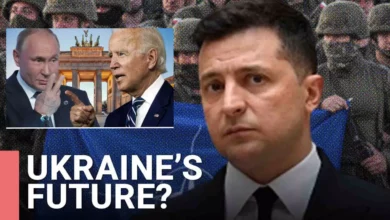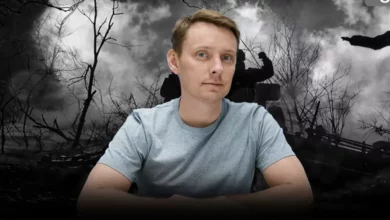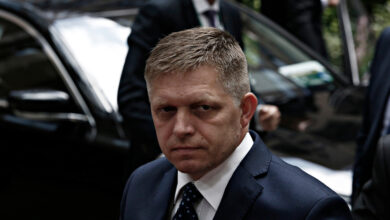Russian Propaganda film about Ukraine war ‘Witness’
Russian Propaganda film about Ukraine war 'Witness'
Kremlin’s propaganda film about Ukraine war plays to empty Cinema. The story of ‘Witness‘ revolves around the fictional violinist from Belgium who travels to Kyiv for a performance in February 2022, only to have his plans disrupted by the onset of Russian bombings in Ukraine. He survives harrowing ordeals amidst what he perceives as brutal acts and provocations by Ukrainian nationalists. Eager to reveal the truth of his experiences, he aims to share the reality of the situation with the world. This narrative aligns closely with the Kremlin’s persistent portrayal of the conflict since its inception, meticulously packaged within the medium of a motion picture.
Kremlin’s Propaganda Film: ‘Witness’ Narrative
Propaganda film “Witness,” a government-backed theatrical production released in Russia on August 17, marks the inaugural feature film addressing the ongoing 18-month-long invasion. Within its narrative, it portrays Ukrainian military forces as aggressive individuals with neo-Nazi affiliations, portraying them as perpetrators of violence, torture, and internal brutality. The Propaganda film showcases characters within these forces donning attire featuring Hitler and engaging in drug consumption. Additionally, it includes a scene where the protagonist’s young son questions the relationship between Ukraine and Russia, asking, “Aren’t Ukraine and Russia the same?” The first full-length film about the battle, directed by David Dadunashvili, Svidetel (Witness), debuted in 1,131 Russian theaters in August.
Producers of ‘Witness‘ suppressed additional box office figures

Svidetel has received one star out of ten on the review aggregator website IMDB and faces nothing but negative feedbacks from the audiences. Even though the Propaganda film had a $2 million budget, it was a huge failure at the box office, earning only $70,000 in its first four days of release. It was one of the biggest busts. Hollywood productions were screened in small theaters, which was made worse by a forceful marketing push and a lack of rival films as a result of Western sanctions.
Criticism and Responses
Since 2014, Russia has produced twelve Propaganda films depicting the annexation of Crimea and pro-Moscow militants in Ukraine’s Donbas region. Despite their Propaganda film production, these films were generally overlooked and forgettable, even among the most ardent opponents or supporters of the conflict. In a blog post last year, Zakhar Prilepin, a novelist known for his affiliation with separatist groups and admission of involvement in the conflict, criticized the state’s failure to create films depicting the heroic figures from the Donbas region over the past nine years. Along with writers, and rock and rap musicians, he also bemoaned the departure of Russian actors and directors.
Government Subsidies: Mismanagement and Corruption Allegations
The Culture Ministry of Russia set aside $395 million in November of last year for films that would explore “the current confrontation with the ideologies of Nazism and fascism,” the conflict in Ukraine, and the “spiritual leaders and volunteers” of Russia.
One of them will be a TV show based on The Volunteers’ Romance, a book by Prilepin.
According to series director Oleg Lukichev, it will explore “the Russian identity.”
Prilepin acted in a unique, highly regarded war movie in 2018.
The United States Tribeca Film Festival awarded Phone Duty, a short film about the insurgents in the Donbas, the Best Narrative Short Prize.
A petition signed by thousands of Ukrainians called for an apology from the festival’s organizers.
Crimea, a 2017 melodrama that Russian Defense Minister Sergei Shoigu commissioned and which cost his ministry almost $2.5 million, is another commercial failure.
However, the people who uploaded it to YouTube and file exchange networks did not do so to make money.
Maria Zakharova, a spokesman for the Ministry of Foreign Affairs, encouraged Ukrainians to view it “for enlightenment and contemplation.”
According to a review on Russia’s premier film enthusiast website, Film.ru, it is “crippled and unsophisticated propaganda.”
In the meanwhile, Serhiy Loznitsa, a Ukrainian director who won the 2018 Cannes Film Festival, canceled the distribution and screenings of his drama Donbas in Russia.
Despite the region’s symbolic significance in modern Russia, several films about Crimea have not received favorable reviews from audiences.
Outspoken propagandist Margarita Simonyan wrote the slapstick comedy The Crimean Bridge – Made with Love, which was directed by her husband Tigran Keosayan and cost $1.4 million but made $250,000. The Kinopoisk.ru review aggregator gave it a 2.5 out of 10, which Keosayan attributed to “sick people” and “Ukrainian bots.”
No more masterpieces
On the other hand, several Soviet-era classics that were supported and restricted by Communist authorities are still taught in cinema institutions across the globe.
Sergei Eisenstein’s Battleship Potemkin, released in 1925, was a groundbreaking work in film editing.
In 2015, UNESCO presented Earth, a silent drama about collective farms written by Alexander Dovzhenko in 1930, to mark the 70th anniversary of the UN cultural department.
The arthouse meditations of Sergey Paradzhanov and Andrey Tarkovsky, which have won numerous international awards, continue to inspire filmmakers and even pop stars like Lady Gaga.
“Unlike Eisenstein or Dovzhenko, these days, nobody truly believes in what they’re doing,” Askold Kurov, who filmed and co-produced Welcome to Chechnya, a 2020 award-winning documentary about the persecution of LGBTQ Chechens, told Al Jazeera.
Soviet filmmakers believed in Communism’s messianic message,Propaganda film, revolutionized cinematic expression, and developed a new artistic language. But their experiments were cut short by the Stalinist dogmas of “socialist realism”, he said.
Anti-Western nationalism and nostalgia for the Soviet and czarist eras coexist in Russia’s present ideology.
“These days, everything the government commissions turns into boring crap. Because decent people don’t get involved,” Kurov said. “Because there is embezzlement of huge budgets, they need directors and producers who are easy and safe to deal with.”
The very nature of filming itself may be another factor.
Only a small percentage of the 200 or so Russian films that are released each year are profitable.
According to an industry source, a lot of Propaganda film makers would rather rely on government subsidies—and steal substantial portions of them.
“They hope for freebies from the state. And the freebies come in, but those who get them steal them, an actor who has appeared in dozens of Russian movies and television shows told Al Jazeera under the condition of anonymity.
“Far less than a half” of the budget reaches the production team, he said, but everyone in the production chain is involved in the corruption.
Corruption is not something that corrodes the system but something that holds it together,” he said.
Profits are not our priority’
The 1990s saw a terrible transition in Russia’s film industry, and it wasn’t until the early 2000s that a few blockbusters were able to hold their own against Hollywood productions.
At that point, Vladimir Putin became president of Russia, and the Federal Security Service (FSB), his former school, funded propaganda.
In the 2007 parody of Charlie’s Angels and James Bond movies, The Apocalypse Code, a female FSB agent wearing skimpy clothing saves the world.
Critics gave the $15 million movie a negative review and it only made $7 million.
The non-profit Fund to Support Patriotic Films, which created it and included security and defense personnel on its board of trustees, didn’t seem to care.
“Profits are not our priority,” the fund’s head, Olesya Bykova, told this reporter in 2008. Instead, she said, her fund focused on something that could inspire “respect to people who represent our country, to security officers, to our traditions, and love for our motherland”.








